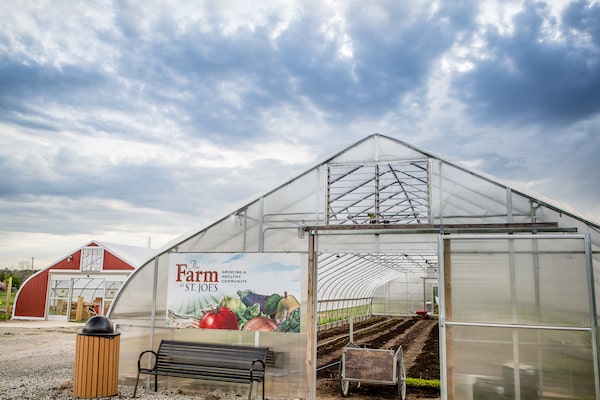Subscribe: Apple Podcasts | Spotify | Amazon Music | iHeartRadio | RSS | More
In Edible-Alpha® podcast #51, Tera interviews Amanda Sweetman, Farm Project Manager at The Farm at St. Joe’s, part of Saint Joseph Mercy Health System in Ann Arbor, MI. In order to create a more plant forward and healthy diet for the larger community, executive leadership and key physicians at the hospital began making improvements to their current food systems, including taking out fryers from the hospital kitchens and educating culinary staff, physicians and patients on how to prepare healthier food. The farm started in 2010 in conjunction with these larger improvements and goals, also with buy-in from executive leadership as well as hospital staff and the larger community.
The Farm at St. Joe’ provides 9,000 lbs. of produce to the community through various channels. One channel is a farm share CSA style program for staff and community members that runs 36 weeks total and provides 126 whole share equivalents in partnership with 12 other farms, generating $82,000 of revenue for small, local farms. The Farm Share is supported by Jae Gerhart, the Michigan State Extension Washtenaw Local Food Coordinator.
The farm also operates a farmers market in the hospital lobby open to the public in conjunction with one other farmer. Through their Produce to Patients program, health care providers can order produce at wholesale prices from the farm to prescribe in clinics to treat chronic health conditions like diabetes. In 2017, they worked with 5 clinics and served 250 patients. In 2018, they increased that to 10 clinics and 3,500 patients.
The farm isn’t just a physical location that grows produce – it is part of a commitment by the hospital system to extend healthcare and wellness beyond the hospital campus and empower the community to lead healthier lives. They do events for people of all ages, including educational programming that serves about 1,000 kids per year that makes curiosity about science, agriculture and health cool through experiential activities. They also have accessible garden beds to help with rehabilitation and therapy for people with traumatic brain injuries through the Eisenhower Center. These events and points of connection help people touched by the hospital to feel like they are part of the St. Joe’s community, helping to address the main social determinant of health: social isolation.
Now, the farm is looking to expand is production and pickup facilities as well as add capacity through hiring staff. And, the farm is looking to replicate its larger community engagement and wellness through food with other hospitals in its system. However, other sites may not need a physical farm or have the space, and building the leadership/buy-in at the hospital and the relationships with the larger community will take time. Thus, what “the farm” concept looks like at other hospitals will likely be very different even with the same goals and outcomes desired in community health.

